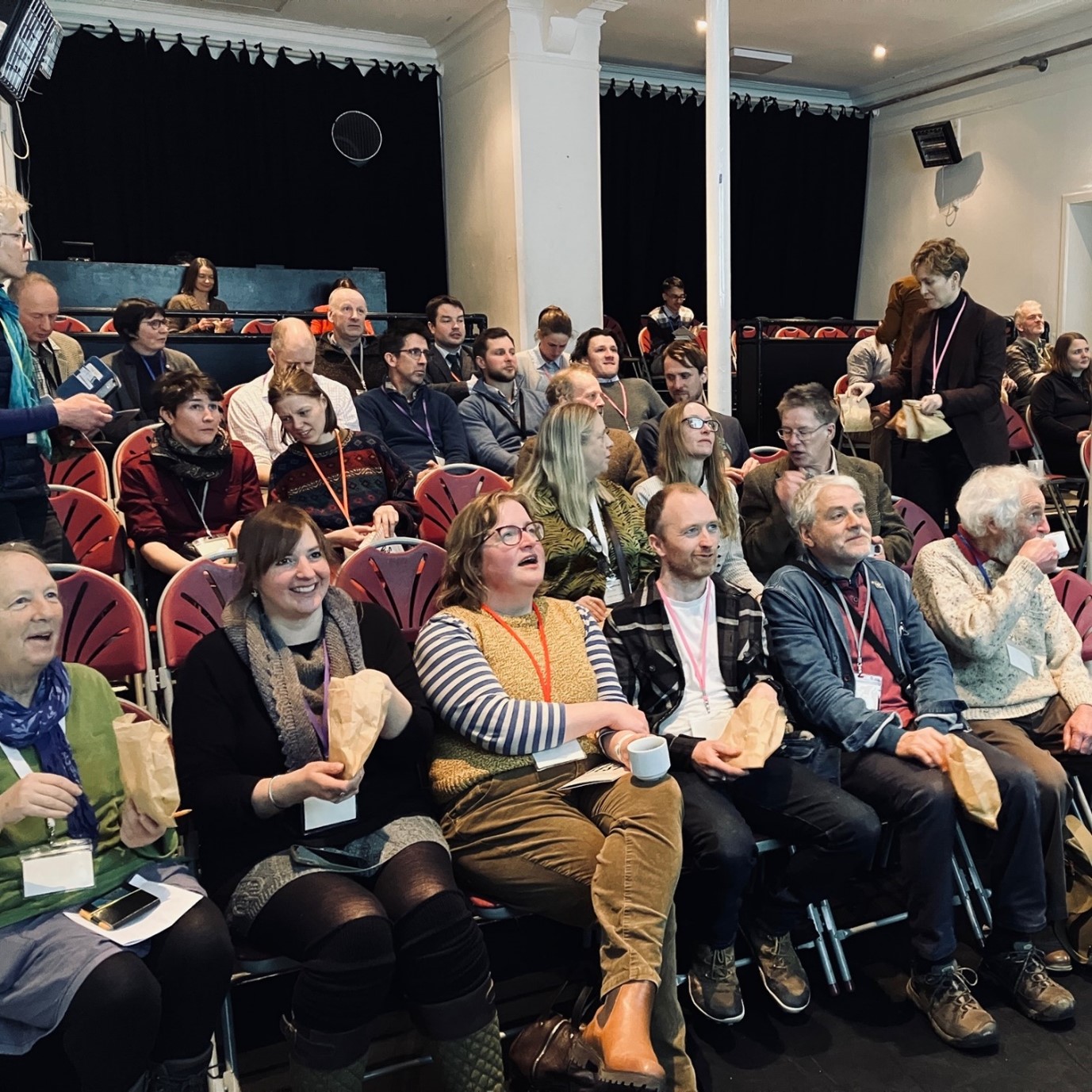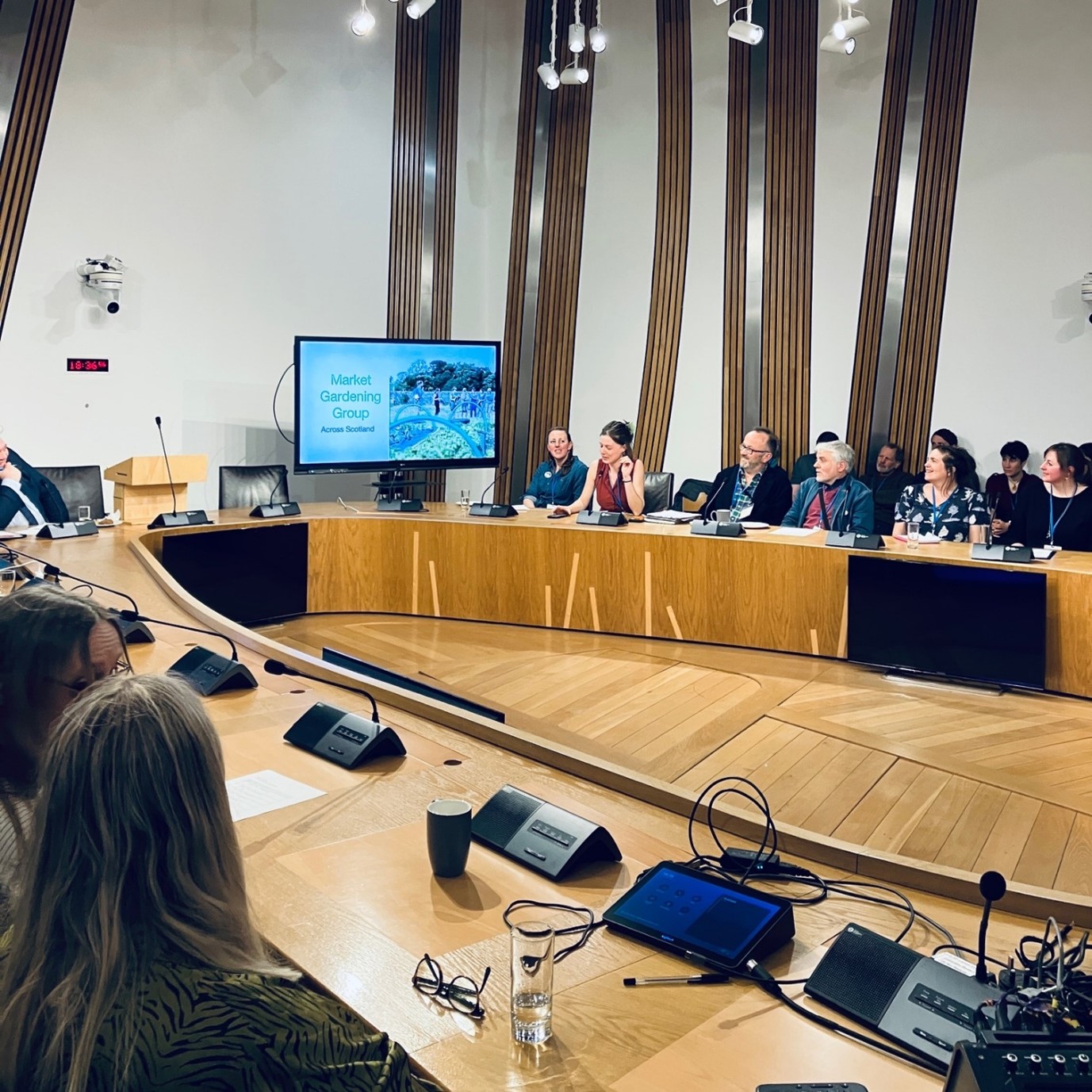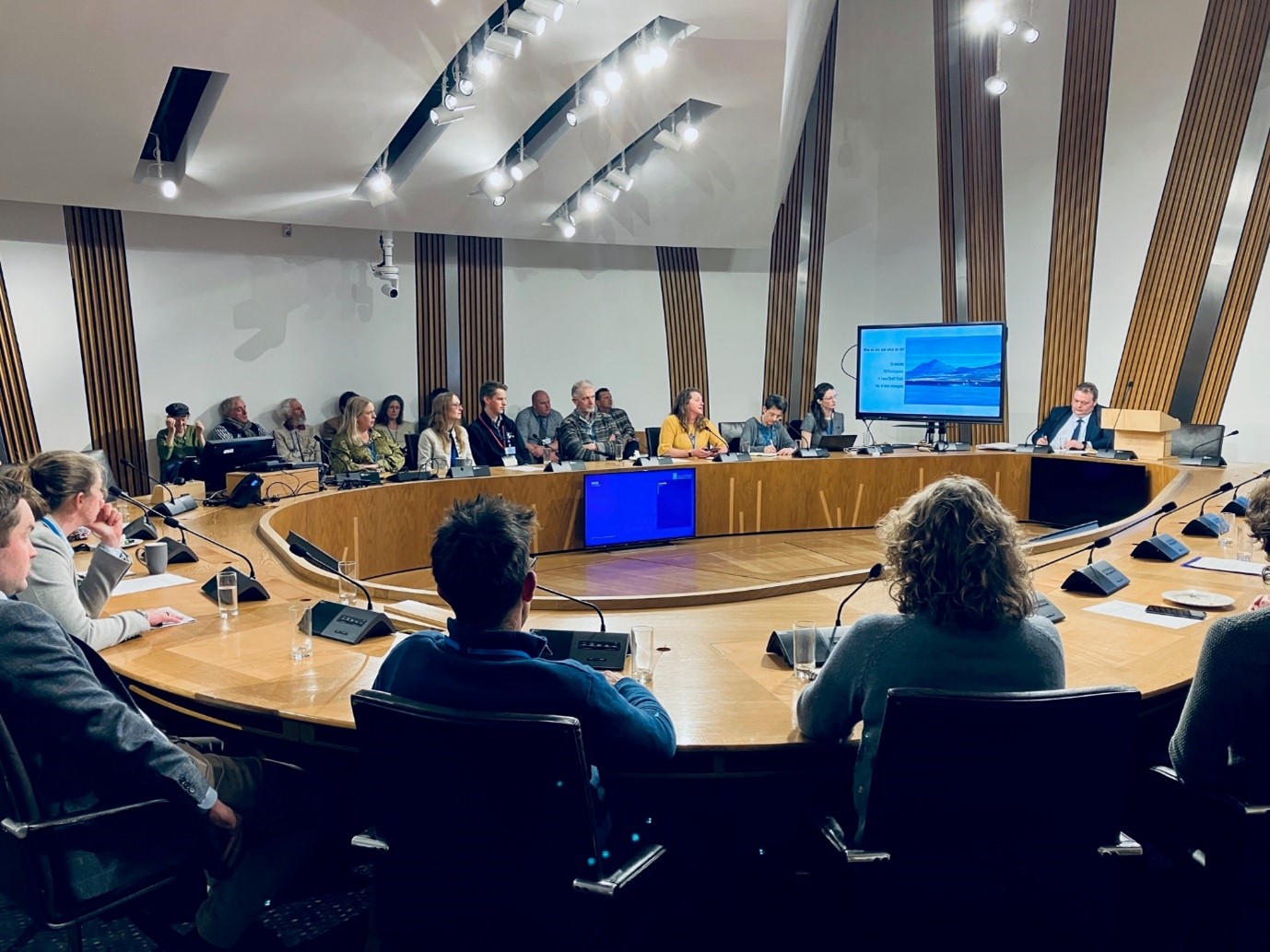Demonstrating the benefit to farmers, crofters and growers
A complexity which relates to all elements of the agricultural transition is measuring the impact of actions taken. This pertains both to on-farm actions and peer-to-peer learning in equal measure. Whilst carbon and biodiversity audits are attempting to measure the former, there is no clear assessment tool for how impactful knowledge exchange has been.
Therefore, one of the best ways to quantify it is to see whether it has made a tangible difference for those who have engaged in it, by taking both confidence and skills from peer-to-peer learning. The culmination of the project was on the 27 February 2024, where 37 of the farmers, crofters and growers from across Scotland came together to exchange a summary of ideas and explore how impactful the project had been. They were then able to present to MSPs and senior civil servants on what needs to happen next.
![]() The impact of peer-to-peer learning was demonstrated in the afternoon as participants shared what they had learnt and developed through working within the groups. This was a good starting point to examine what the Scottish Government’s vision for agriculture would ideally look like if collaboration was at the heart of it. An integrative system shift was recognised as required by most participants.
The impact of peer-to-peer learning was demonstrated in the afternoon as participants shared what they had learnt and developed through working within the groups. This was a good starting point to examine what the Scottish Government’s vision for agriculture would ideally look like if collaboration was at the heart of it. An integrative system shift was recognised as required by most participants.
It was felt that direct marketing, shorter supply chains, and public procurement could help to provide sustainable nature-friendly food to schools, hospitals, and households. Additionally, local people could become better educated about their food and where it comes from through farm visits. Consequently, local food systems would be more resilient, and farmers and crofters would see a fairer return for their produce.
There was a recognition that this would require long-term policy commitment in agriculture, as well as long-term changes in related but distinct areas. Land access was commonly brought up as needing reform, in part to encourage new entrants and create more routes into agriculture and horticulture. Embedded in this was a common demand for small farm units to increase access to land and an accompanying for small holdings to be aptly recognised in the subsidy system. There was also a need to provide security for tenancies.
The afternoon focused on other areas, such as how different levels of governance (national, regional and local) could improve engagement with agir-environment schemes. Within this, the value of peer-to-peer learning was demonstrated as groups recognised that trusted voices are needed to deliver training. There was an understanding that knowledge availability could be unlocked, as most of it is held by current practitioners. It could also provide an additional revenue stream to farmers and crofters who deliver mentoring and training. This coming together of farmers, crofters and growers helped to propagate novel ideas. Participants could learn from one another’s successes and failures, and learn how to adapt practices on their own farm.
The day was bisected by a series of screenings which showcased the work of the groups from the past year - an example of which is presented by NFFN Scotland’s Vice Chair Phil Knott: Cattle and Corncrakes: how are cows delivering for high nature value farmland?
 Demonstrating benefits to policy makers
Demonstrating benefits to policy makers
The afternoon of spirited discussion was followed by a parliamentary session, sponsored by Finlay Carson MSP and hosted by Jamie Halcro Johnston MSP. One of the additional benefits of peer-to-peer learning in a group setting is helping to deliver the confidence to discuss policy with legislators and civil servants. This creates a positive feedback loop whereby government can learn from those who are impacted by the policy and, in turn, the policy can be improved.
Group presentations were delivered by the seven knowledge exchange groups, which covered participant’s backgrounds, the types of knowledge transfer methods used, and the key learning points and challenges. Finally, groups presented their key policy asks moving forwards.
 A key message from across the groups was the integral importance of nature and biodiversity to the resilience of businesses. Within this, many practical topics associated with the group were covered such as parasite control, soil health and business skills. Commonly perceived challenges included the current supply chain, an inability to access land, rapid climate change and the perilous financial landscape. Each presentation honed in on the fact that seeing successful models which integrated nature had been pivotal in teaching others how to be profitable.
A key message from across the groups was the integral importance of nature and biodiversity to the resilience of businesses. Within this, many practical topics associated with the group were covered such as parasite control, soil health and business skills. Commonly perceived challenges included the current supply chain, an inability to access land, rapid climate change and the perilous financial landscape. Each presentation honed in on the fact that seeing successful models which integrated nature had been pivotal in teaching others how to be profitable.
Often, policy asks centred on funding and improving the knowledge transfer system by increasing the budget and agreeing multi-year funding for KTIF projects. It was also asked that policy changes be time-bound, with clear and simple stipulations attached so that farmers and crofters can have the confidence and time to adapt their business accordingly. Furthermore, there was a recognition that there will need to be reasonable financial reward for agroecological practices.
The open discussion which followed grappled with much of the nuance around the changes. MSPs reflected on what they had heard, and recognised a need to look at specific areas such as public procurement as well as local abattoirs. They also noted that policy needs to be joined up and that there cannot be five-year cycles where farmers and crofters are repeatedly having to adapt. In short, policy aims need to be longer-term.
This lack of certainty was taken seriously by the MSPs present, and the difficulty of business planning around that was recognised. The 37 farmers, crofters and growers present got to express their concerns with this lack of clarity and fairness in the system, which ranged from the allocation of subsidy funds to definitions of natural capital.
 This discussion highlighted the complexity that is associated with the agricultural transition and how effective peer-to-peer learning can be in navigating through it. The meeting was very productive for MSPs, learning how they can better legislate for these issues as well as the project attendees, who had their voices heard and could demonstrate the value of peer-to-peer knowledge transfer.
This discussion highlighted the complexity that is associated with the agricultural transition and how effective peer-to-peer learning can be in navigating through it. The meeting was very productive for MSPs, learning how they can better legislate for these issues as well as the project attendees, who had their voices heard and could demonstrate the value of peer-to-peer knowledge transfer.
Next steps
Within the presentations and the discussion that occurred in parliament it was clear that there were some distinct policy asks. The Scottish Government recently conducted an informal consultation on the future of AKIS and Tier 4. It is very important that peer-to-peer learning becomes a key part of it. It is an effective way to deliver the requirements and incentives across the other tiers.
Recognising the skills and knowledge that already exists within the agricultural system is vital. Farmers, crofters and growers already have many of the answers to the government’s questions. They deserve to be financially rewarded to help up-skill those within the sector that do not have skills or experience in a particular area.



 Demonstrating benefits to policy makers
Demonstrating benefits to policy makers A key message from across the groups was the integral importance of nature and biodiversity to the resilience of businesses. Within this, many practical topics associated with the group were covered such as parasite control, soil health and business skills. Commonly perceived challenges included the current supply chain, an inability to access land, rapid climate change and the perilous financial landscape. Each presentation honed in on the fact that seeing successful models which integrated nature had been pivotal in teaching others how to be profitable.
A key message from across the groups was the integral importance of nature and biodiversity to the resilience of businesses. Within this, many practical topics associated with the group were covered such as parasite control, soil health and business skills. Commonly perceived challenges included the current supply chain, an inability to access land, rapid climate change and the perilous financial landscape. Each presentation honed in on the fact that seeing successful models which integrated nature had been pivotal in teaching others how to be profitable.  This discussion highlighted the complexity that is associated with the agricultural transition and how effective peer-to-peer learning can be in navigating through it. The meeting was very productive for MSPs, learning how they can better legislate for these issues as well as the project attendees, who had their voices heard and could demonstrate the value of peer-to-peer knowledge transfer.
This discussion highlighted the complexity that is associated with the agricultural transition and how effective peer-to-peer learning can be in navigating through it. The meeting was very productive for MSPs, learning how they can better legislate for these issues as well as the project attendees, who had their voices heard and could demonstrate the value of peer-to-peer knowledge transfer.